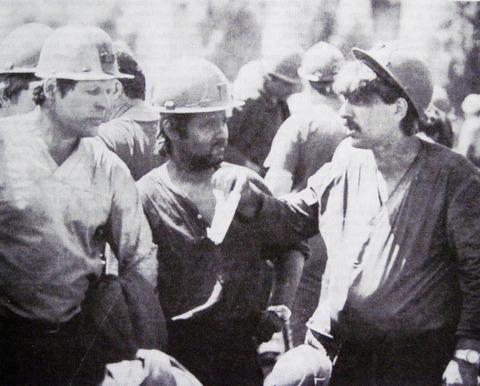Home > 04 - Livre Quatre : HISTOIRE CONTEMPORAINE > 25 years ago: Soviet coal miners defy Stalinist regime
25 years ago: Soviet coal miners defy Stalinist regime
Friday 18 July 2014

25 years ago: Soviet coal miners defy Stalinist regime
By the end of this week in 1989, the wildcat strikes of Soviet coal miners spread from Siberia to regions as far as Ukraine, involving hundreds of thousands. Among the areas affected were Karaganda in Kazakhstan, Vorkuta in the Ural Mountains, Rostov on Don in European Russia and Dnepropetrovsk in Ukraine.
The strikers in the Kuznets basin of Siberia presented a list of 40 demands, including increased supplies of sugar, soap and detergent, meat, condensed milk, tea, coffee and cocoa, and warm winter clothing. The workers also demanded better working conditions and more concern for the environment.
The Workers League Political Committee issued a statement in the July 21 issue of the Bulletin, one of the predecessors of the World Socialist Web Site :
“The mass strike movement of miners in the Soviet Union, the largest strike wave since the consolidation of Stalinist rule in the 1920s, is a historical milestone for the world working class. The Soviet working class is directly challenging the power and privileges of the bureaucratic caste which usurped power from the proletariat, murdered the Bolshevik leaders of the 1917 October Revolution and has served ever since as the main counterrevolutionary force within the international workers’ movement.
“The strike by hundreds of thousands of coal miners is a rebellion, not against communism and socialism, but against Stalinism. It expresses the grievances of the working class which have accumulated for decades against the parasitic bureaucracy, with its police-state despotism and criminal mismanagement of the planned economy, which now find their culmination in Gorbachev’s plans to restore capitalist property relations and destroy all the gains of the October Revolution.”
A Siberian striker, Alexander Kusaimov, was interviewed by the press: “Finally, the time came for us to wage war with the bureaucrats. In the mines, bureaucrats are useless. They just take, take, take. And we work our lives away, and for what? We hear every day about reforms from Moscow, but in Kemerovo, we don’t feel it. Everything is rationed. You can’t even find a damn match to light a cigarette with—if you can find any cigarettes.”
Other workers expressed their anger at the bureaucrats: “They sit on their butts and get double and triple what we make in the pits.”
While reported in the official media, the strike was met with unconcealed hostility by the Stalinist leadership under Gorbachev, warning against possible government intervention. Of particular concern was the appeal by miners for railroad workers to join their strike on August 1. “Such a development of events poses a threat to the implementation of perestroika,” he said.
